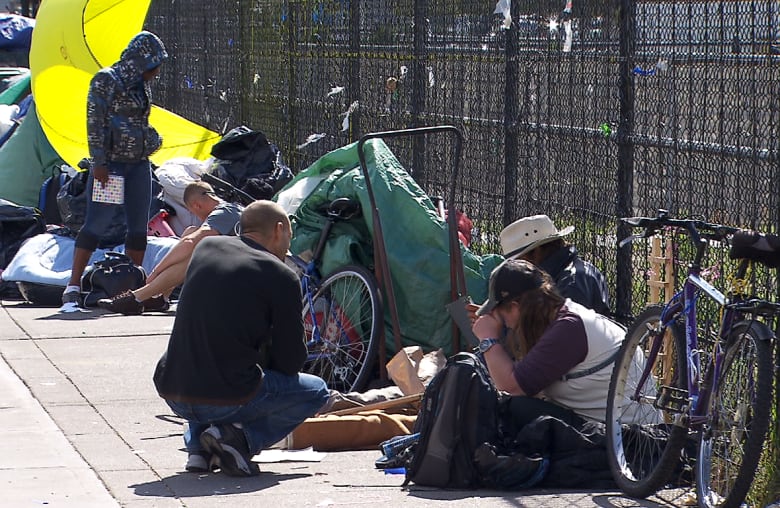The new face of fighting fentanyl — Kati Mather's road to recovery
3 months later Kati Mather is off the streets and in treatment along with her twin sister Jessi

The last time I saw Kati Mather she broke my heart.
I found her living on the street. And not just any street — The Strip, the infamous drug hangout in Surrey, B.C.
The 22-year-old, with her blond dreadlocks and perky personality, seemed more like 16.
But her young face was ravaged by bloody, open sores. I thought she had been beaten.
Instead, it turned out her assailant was fentanyl.

Kati agreed to talk to me as I gathered information about the powerful opioid creeping into street drugs across the country.
For most users, it's accidentally ingested — an unexpected additive that has caused a record number of overdoses and killed more than 700 British Columbians this past year alone.
Her next words that day left me stunned. "I only do fentanyl" she said.
The potential killer had become her drug of choice. She said party drugs she started taking "for fun" when she was 14 had ultimately led to her addiction to fentanyl.
"It doesn't matter how many times I've OD'd, I still use the next day, because the withdrawals are so bad", she told me.
Overdosed 17 times
By her own estimate, Kati would go on to overdose a total of 17 times — brought back to life by the opioid antidote naloxone, now carried by first responders and addicts alike.
But she knew time was running out.
"Every time I do dope, I know I'm taking a risk. I know I might die" she said matter-of-factly.

Kati's story — entitled "The new face of fentanyl" — went viral, with more than 800,000 views and counting.
Some readers criticized me for not calling an ambulance or the authorities and leaving Kati on the street. But as an adult, she had to seek treatment herself.
There was nothing I or anyone else could do, until she made that choice. That is, if she lived long enough to make that choice.
Mercifully, she did.
Kati in recovery, 60 days clean
Meet Kati Mather today. She's almost unrecognizable with her new hair cut and new attitude.
She's off the street and in recovery.
After her story was posted online and broadcast on the CBC, people came forward to help; drug counsellors, intervention specialists, even a benefactor willing to pay for private treatment.
Kati's divorced parents, who had fought in vain for years to get her off drugs, finally had an army behind them.

For the past two months, Kati has been in Westminster House — an addiction recovery centre for women in New Westminster, a few kilometres from The Strip.
I couldn't report that, because her family asked me to hold off until she was 60 days clean.
And there was something else I couldn't report.
Kati's twin sister also fighting addiction
Kati's twin sister Jessi had been living with her on the street, also addicted to fentanyl. Jessi had refused to take part in the original story.

Now, they're in treatment together and willing to talk about their experiences.
We have a slightly awkward reunion at Westminster House, not sure whether to hug or just shake hands.
"I barely recognize you," I tell her.
"And that's only two months" she says, smiling broadly. It's actually three months since we first met on The Strip — but who's counting.
She grows thoughtful about our chance encounter.
"We were lucky to have that opportunity," she says on behalf of herself and her twin sister. "I saw you that day on The Strip and that doesn't happen very often."
I don't tell her how happy that makes me feel — the opposite of the sadness I felt when she made a makeshift seat out of a garbage bag holding her belongings, so she could settle in to tell me her story back in September.
She remembers now how it took one final brush with death to force her to change her life.
Her voice shakes as she thinks back.
3 overdoses in 2 days
"I ended-up overdosing twice in one day and then the next day I overdosed again" she says. "So, it was like three times in two days, and I remember waking up from that third overdose and just had this moment of clarity where I was like, 'What am I doing with my life?'"
For Kati, it was a pivotal moment.

"When I talked to you in September, I thought I didn't have a problem living where I was. But I had to have that moment — This is it, I just can't live this way anymore. I really needed to do that for myself."
Luckily, her sister Jessi was ready too and demanded they go into treatment together.
They knew their luck was running out.
'I thought we were both going to die'
"I thought we were both going to die" says Jessi. "And I would cry about it every single day. And actually, sitting here today, being in this treatment centre with my sister, it's amazing. We have the same "clean" day. And I never pictured our life like this."
Kati is amazed, too.
"I never thought in my wildest dreams that I could be happy like I am today" she tells me.
Jessi has her own reason to be happy. She has a four year-old son she'll be able to spend time with, now that she's sober.
"For the past three years I have been using fentanyl and I haven't been able to be a present mother. And now that I'm in treatment, I've been able to rebuild that relationship with him," she says. "I'm able to have Christmas with him."
I ask Jessi and Kati what the new year means to them.
"A new life" they say in unison.
With files from Manjula Dufresne

